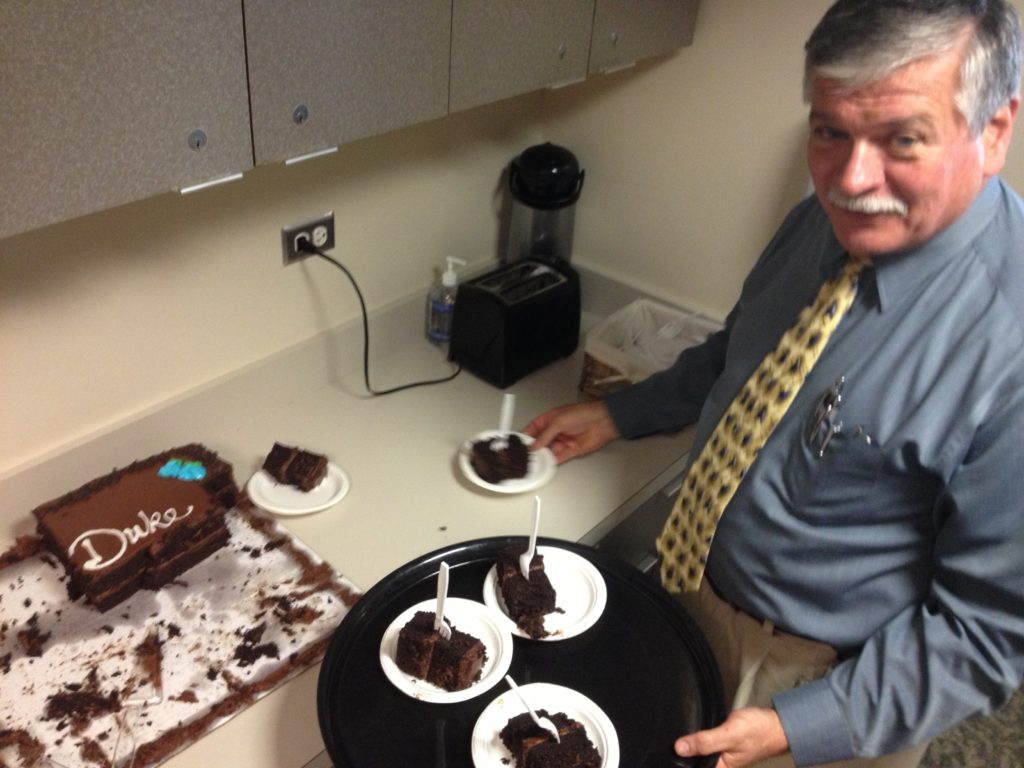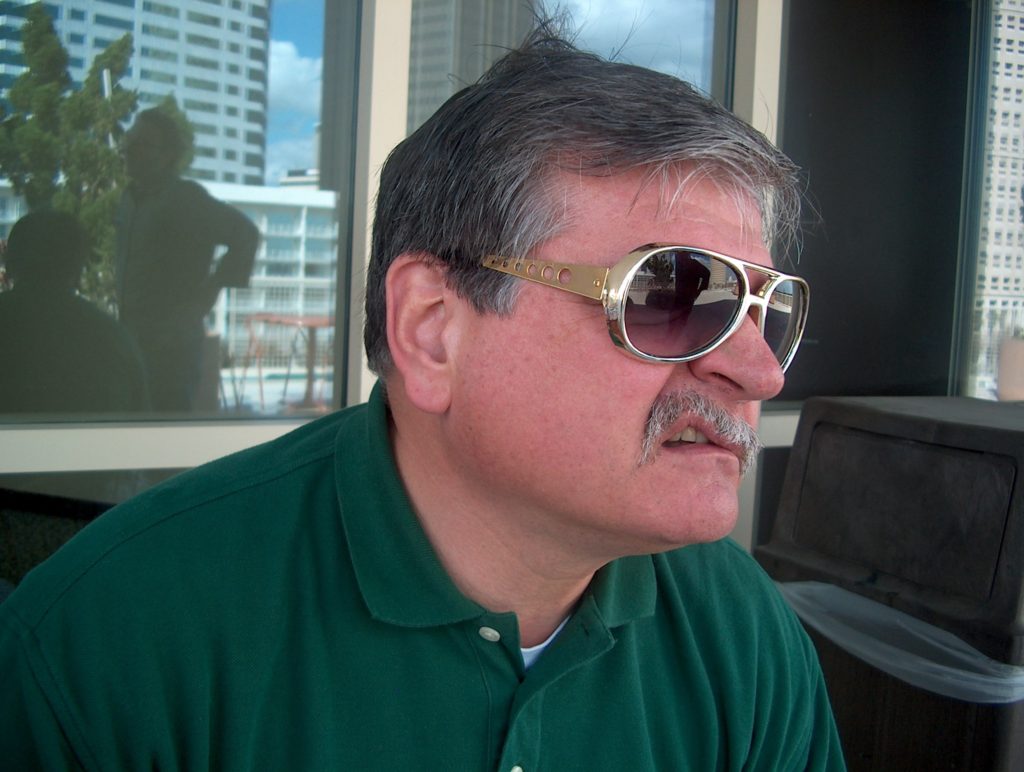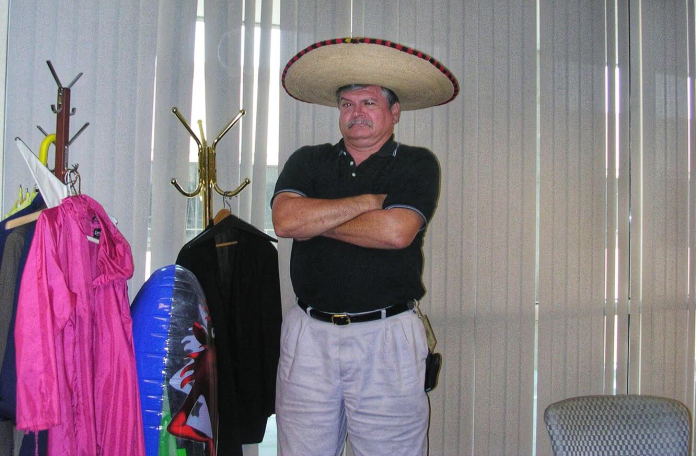By Jeff Houck
I was an assistant features editor at the Tampa Tribune in 2005 under managing editor Duke Maas when changes were made to the food section. I edited the section, so it was up to me to find a writer.
We searched, interviewed, but didn’t really settle on one candidate. I reported this to Duke.
“Why don’t you do it?” he said.
I didn’t want to do it. I wanted to be an editor. I wanted to stay on an editing track. I had been a bureau chief, a city editor and a features editor. I wanted to be Duke. A no-nonsense, smart problem-solver with endless heart, a nose for news and a talent for managing both a fish bowl of fevered newsroom egos and an ocean of angry readers.
He’s the kind of guy that when he left the paper, all the pieces of the farewell sheet cake were sliced away. Except for his name. We worked in a room full of sugar-hungry piranhas. That was respect for the man who died Jan. 28 of terminal cancer.
His sense of the absurdity made working with him more fun. When I handed him a pair of Elvis glasses I bought during a work trip to Nashville, he curled his lip without hesitation. When he came upon a clutch of us sampling a new flavor of Twinkies, he dove in with earnest observations. When I brought a sombrero to work, because why not, El Duque became the first – and I’d argue the finest – model of The Sombrero Project.
“Okay,” he said. “Keep looking.”
We did. There were several candidates who would have done a great job, but there was no perfect fit.
“Why don’t you do it?” he said.
“I really don’t want to be the food writer,” I said.
Okay, he said. Look again.
After I came back empty the third time, Duke said, “Why don’t you do it?”
If I had any ambition to sit one day where he was sitting, it was going to take a very, very long time. A lot of pieces would have to fall into place for that to happen. And it might never happen, he said.
He didn’t say this, and he never would say this, but he said this without saying this: “You don’t want this job. No one should. Managing an underpaid, disgruntled island of misfit toys while producing a newspaper that angers and irritates and agitates as it fights to survive in a rapidly changing business climate against a rapacious, ruthless competitor is no way to go through life. We should all be fishing at high altitude under blue sky every day of our lives, But this is the life I know and the life I love, and I understand completely why you’d want it, too.”
He knew the burden and glory of the big chair. He spent 10 years as executive sports editor at the St. Petersburg Times before moving in 1989 to assistant managing editor for news at the Toledo Blade and then back across the bay from St. Pete to the Tampa Tribune to be sports and multimedia sports editor.

Tribune Deputy Sports Editor Dominic “Nick” Pugliese was prepared not to like Duke when he got the Tampa sports editor gig. After all, Duke had been with the enemy across the bay for many years and he beat Pugliese out for the job.
“Boy, was I wrong.”
Duke made it clear from the beginning that he wanted Pugliese to continue. Together, they would lead the Tribune sports department to great things. They did exactly that, tackling Super Bowls, Stanley Cups, World Series games, NCAA national championships and any other sports monster that looked big, hairy and difficult.
What Pugliese remembers most were the hours of conversations over lunch on the roof of the News Center, about writing for readers, managing the department, and, of course, about their families.
“He loved talking about Erik and Kristin, especially their athletic exploits,” Pugliese said. “He loved telling the story of his wedding reception when they ran out of beer – and took up a collection to get more. And he enjoyed hearing about the exploits of my young daughters, once writing in a Christmas card to enjoy ‘the magical years.’”
When Executive Editor Janet Coats asked Duke to be the Tribune’s managing editor and move out of the sports editor position, she knew she was asking for a big sacrifice. He loved sports so much, and he loved his staff. “But I lured him with the promise that we would do big, ambitious things and beat the St. Pete Times’ ass in the process,” Coats said.
And while they did do that at the beginning, what he signed up for turned out to be awful. Being managing editor as the Tribune went through layoffs over and over and over was, she said, “just soul-sucking work.” Duke never complained about having the responsibility, but it broke his heart every time. He insisted on having those hard conversations face to face – on one occasion, he had to do it on the telephone and he kicked himself about it for weeks.
“He believed everybody who got laid off had the right to look us in the eye when it happened,” she said. “There was only one time he couldn’t bring himself to do it – he asked me to talk to (senior editor for presentation) Pat Mitchell when that day came, because he loved and respected Pat so much he didn’t think he could do it without breaking down.”
It was an interesting room to wrestle. One copy editor’s desk was covered in so many random stuffed, plush animals unrelated to news-gathering activities, they spilled over to an adjacent desk. The grizzled military reporter from Philly kept a gas mask at his desk. The award-winning, lead sports columnist ignored corporate dress code stipulations, sticking instead to a wardrobe of what amounted to 50 shades of khaki cargo shorts, including on the coldest days. The food writer cooked scrapple and pancakes and roasted s’mores at his desk.
Yes, at my desk.
“We laughed a lot,” Coats said. “Duke could laugh at himself more than anybody I know.”
Deputy Managing Editor Larry Fletcher, who sat next to Duke when Fletcher edited metro, routinely messed with the unflappable Maas, who brought an apple daily to work.
When Duke would walk around the office usually wearing his trademark solid long-sleeve dress shirt buttoned to the cuffs and a requisite middle-age-guy tie always knotted to the neck, Fletcher would sneak in, take a bite out of the apple and turn the hole toward the wall.
“When it was time to eat, I would hear a little rustling, then just a muffled ‘Damn!’ through the wall,” Fletcher said. Duke, who had a penchant for consuming apples core and all, never dusted for fingerprints, no matter how many times it happened. Didn’t matter who did it.
Fletcher also confesses to placing a remote-control fart machine under Duke’s seat.
“When he had guests in, I’d activate it,” he said. “Duke’s hearing wasn’t so good, so it usually just served to make his guests a little giggly, and maybe a bit wary of working too closely with Duke.”

Serving as a sports editor before becoming the Tribune’s managing editor, Duke was given the task of merging the Tampa Tribune’s sports staff with TV station WFLA and TBO.com, which was co-owned by parent Media General and worked one floor below the newspaper newsroom. The organizations collaborated previously, but sports was a key place to deploy what MG was touting as “convergence.”
Tribune sports writers would appear on WFLA broadcasts as well as blog and podcast in addition to their print duties. TV, ink and online sports departments mashed into one.
It took Duke’s deft handling to bring the groups together and to reconcile differing attitudes, values and mediums, Fletcher said. The sports effort became a shining example of what multimedia journalism could be, if not the huge profit center MG hoped it would become. It would not have happened at all without the steady hand of Duke Maas.
“He brought people together. He listened. He provided vision and guidance,” Fletcher said. “There were plenty of people unhappy about the move, but Duke handled them with compassion, understanding and humor.
“He never lost his temper, and he never lost sight of his goal.”
The key to Duke Maas, said Ken Koehn, who succeeded him as managing editor at the Tampa Tribune, was patience.
“He had patience when we argued in news meetings, patience when we immaturely wisecracked in meetings and patience to work through difficult financial problems when there were no good answers,” Koehn said.
“An anecdote I’ll always remember was a joke between two Germans,” said Koehn, who is of German ancestry. “I should have known better. But when discussing a story about coach Urban Meyer, I cracked: ‘Who in the heck names their kid Urban, anyway?’ Duke looked at me and calmly replied: ‘My grandfather.’ I was unusually silent for a change.”
It wasn’t as if Duke asked for the tough assignments. With a solve-first, complain-never approach, the hard stuff just had a way of finding him. During what seemed like a semi-annual reconfiguration of newsroom seating and cubicle shuffling to manage the changing employee roster, it was Duke’s burden to not only verify the measurements – he’d heel-toe distances to double-check, like some sort of auditor at Office Depot – he also had to endure the squawking of anyone who disliked their new perch.
“Everyone would pester him to see the seating chart and then they would make their case why they didn’t want someone sitting in a certain spot,” newsroom manager Mary Beth Thompson said. “He always listened and made changes if necessary. He always took the time to listen to everyone.”
So instead of ranting and telling me why I should never want to have his office and the anchor of the thankless job that came with it, Duke instead said to me, gently and patiently, “You could do the food writing job and have fun with it.” There was hope in his voice.
Pause.
“I think I’ll take the hint,” I told him. I shook his hand the next day and thanked him.
So I did. I became the food writer. And my life changed forever. Almost everything since that conversation can draw a straight line to that conversation.
The days in the Tribune newsroom until Duke left in 2012 became beyond belief for him, with an incomprehensible professional terribleness of managing shrinking dollars and seemingly endless layoffs.
“In the end, I sometimes wished I’d never asked Duke to leave sports,” Coats said. “It was unfair that such a good man had to do such ugly work.”
Duke was the kind of boss who took the time to write a note, or send an email or stop by your desk to tell you how much he liked your story,” religion writer Michelle Bearden recalled.
“He’d remember a certain turn of phrase or a quote that stood out for him,” Bearden said. The two bonded over discussions of faith and passion for Tampa Bay Rays baseball. “And that meant a lot for us “little people” who toiled in the field every day … It made you feel special that someone cared and was paying attention.”
On the day Duke stood in our newsroom and announced his departure for Pittsburgh, Bearden was unable to restrain her tears. “I downright sobbed,” she said. “I felt like the heart of our operation was being ripped out. And I turned out to be right.”
After he left the Tampa Tribune to work in Pittsburgh and, later, Opelika, Ala., the challenges followed. Last year he became very sick with cancer, in a way I’d never wish on anyone so fine and good and lovely. He and I shared the Lutheran faith. I’m in awe of how that deep faith sustained him through his illness. He remains, all these years and miles later, an inspiration to me.
My family and I owe Duke so much that I can never repay. I love him and think of him often at times when I cannot fathom what my beautiful, rich, entirely surreal life has become.
All because he asked, “Why don’t you do it?”
Epilogue: After I recently posted my story on Facebook of how Duke changed my life, a flood of responses filled the comments.
“Yep,” said Chip Towns, who worked at The Blade when Duke was assistant managing editor for news. “Same guy so many of us in Toledo respect and admire.”
Debra Erdley, who worked with Duke in Pittsburgh at Trib Total Media, described him as smart, decent and “the finest sports guy I ever worked with.”
Matt Neistein, who also worked with him in both Tampa and Pittsburgh, said when he heard TTM hired him to be deputy managing editor, “I turned to anyone who would listen and said, ‘I don’t know what his job will be here, but regardless, we just got better.’”
When Duke walked into the Pittsburgh newsroom the first day, he was strolling to the executive editor’s office when Neistein ambushed him.
“I only worked in Tampa for 15 months. Ten of those were in the editorial section, which had minimal contact with the greater newsroom. The next five were at TBO on the night shift — again, not a job that puts you in contact with a lot of print honchos. And I’d left two or three years prior to Duke’s arrival in Pittsburgh.
“So I intercept Duke in the middle of a strange newsroom and greet him. He stopped and turned his head. His face brightened. ‘Matt! I didn’t know you were here! How are you?’ I’d interacted with him maybe a half-dozen times three years earlier in a busy newsroom, had never worked directly under his supervision, and he knew me on sight by name.
“That’s Duke.”
Click over to his Facebook page. It’s like an enormous meadow of compliments and well-wishes. You could spend hours reading them all.
So many lives changed by one good man.
One last note: My goal in writing the Facebook post was for him to see it before he passed. I didn’t know if I’d make it in time. On Nov. 29, he made a blog post about his health issues with the headline, “Final chapter begins with Hospice …” He quoted Psalm 56:
“…I will not be afraid. What can mortal man do to me?”
His liver, full of cancer, was rebelling. His weight loss was pronounced. The pain was immense. So was the nausea and hives. His doctor estimated he might not see the new year. Goodbyes had begun, he said. Visitors had to be limited. It was too excruciating otherwise.
“I try to stay focused on thanking God for all the joy and blessings He has given me over the past 65 years,” Duke wrote.
So when I saw that his Facebook account had clicked “like” on my tribute post a few days after it went live online, I thought, “Oh, someone in his family saw it.” That was a comfort. It somehow penetrated the veil.
Then the photos of Duke with the farewell cake were liked. Then the photo of him in the Elvis glasses. On down the line.
It was Duke.
Then came a DM.
“Jeff — Would you mind emailing to me a digital copy of the sombrero photo?” he asked. “We want to use it among other photos for my life celebration gallery.”
A chill ran through me. He’s planning his final story.
He thanked me for sharing my post.
“I am overwhelmed by the stories from so many people whose lives have intersected mine,” he wrote. “Love ya, man. / Duke Maas …”
I didn’t know what to say. So I did the best I could do for someone who did so much for me. I told him that I loved him, too.
“All I did was tell the truth,” I wrote. “You did the rest.”





